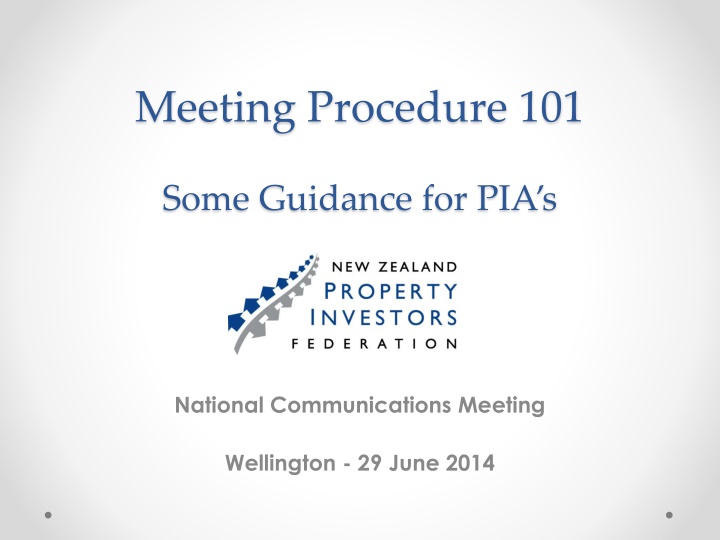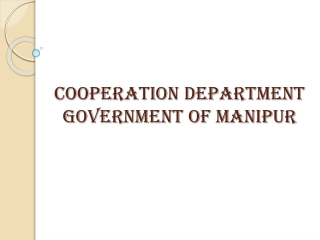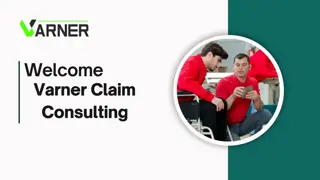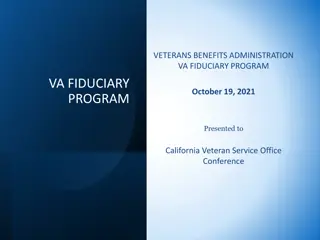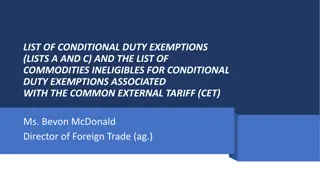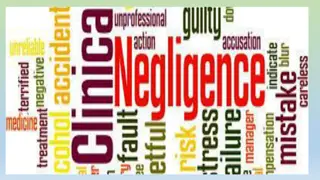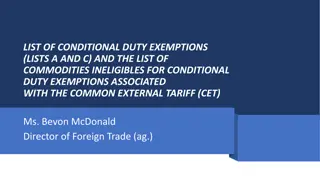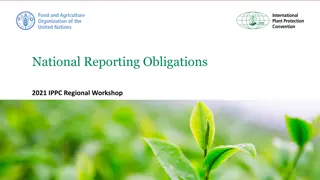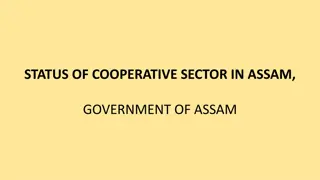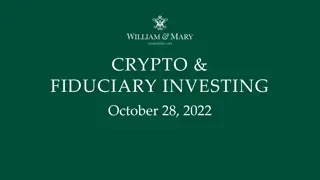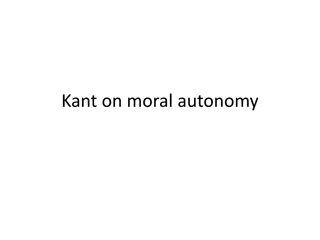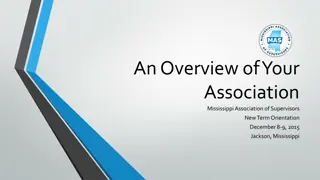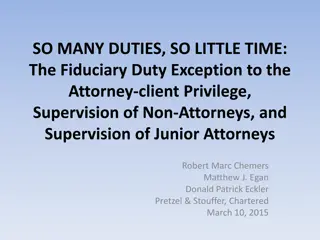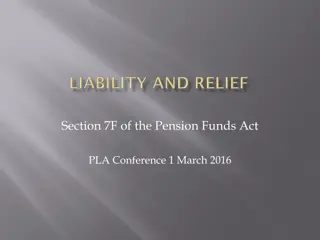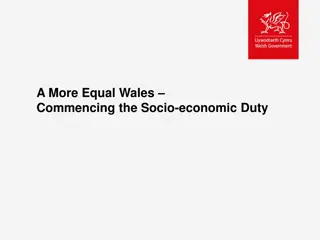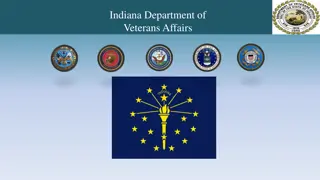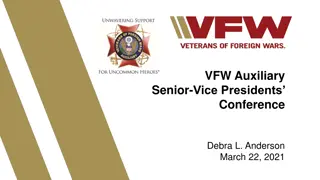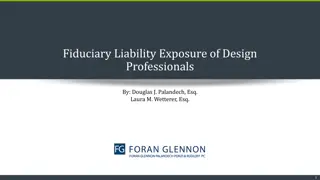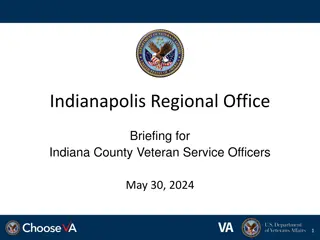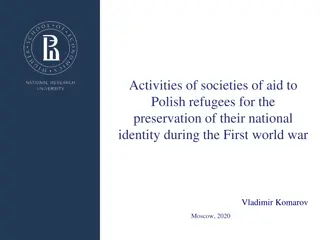Obligations and Fiduciary Duty of Officers in Incorporated Societies Act 1908
Explore the essential requirements and responsibilities outlined in the Incorporated Societies Act 1908 for officers serving in incorporated societies. Discover the significance of fiduciary duty and the obligations that officers must uphold to act in good faith and in the best interests of the society. Gain insights into the roles, responsibilities, and ethical considerations involved in governing and leading a registered society effectively.
Download Presentation

Please find below an Image/Link to download the presentation.
The content on the website is provided AS IS for your information and personal use only. It may not be sold, licensed, or shared on other websites without obtaining consent from the author.If you encounter any issues during the download, it is possible that the publisher has removed the file from their server.
You are allowed to download the files provided on this website for personal or commercial use, subject to the condition that they are used lawfully. All files are the property of their respective owners.
The content on the website is provided AS IS for your information and personal use only. It may not be sold, licensed, or shared on other websites without obtaining consent from the author.
E N D
Presentation Transcript
Meeting Procedure 101 Some Guidance for PIA s National Communications Meeting Wellington - 29 June 2014
For discussion Incorporated Societies Act 1908 Obligations of officers i.e. elected positions Fiduciary Duty Authority to Act How does an incorporated society speak Motions and Resolutions Role of the Chairperson Meeting etiquette
Disclaimer Information about to be shared is derived from personal and professional experience and some personal research. Intended for guidance only. Not to be regarded as legal advice. Prepared by Colin Comber Secretary, NZPIF 26 June 2014
Incorporated Societies Act 1908 Sets out the requirements for registration of incorporated societies. Includes: o Not less than 15 persons o Must have a lawful purpose o Not for profit (no pecuniary gain) o Objects o Rules o Appointment of officers o Registration o etc.
Who is an Officer? Officer person who has been elected or appointed to act on behalf of members Act requires rules of a society to provide for minimum of three officers. Typically President, Vice-President, Secretary Treasurer and specified number of members elected to Committee/Executive. Can appoint/co-opt these usually have full participation and voting rights on the Committee
Obligations of Officers act in good faith and in the society s best interests exercise their powers for a proper purpose act in accordance with the society s rules and objects ensure the society s affairs are carried out in a way that does not create a substantial risk of loss to the society s creditors ensure that the society does not incur an obligation that it can t fulfil take reasonable care in exercising their duties ensure that they do not personally profit from their position of trust.
Fiduciary Duty An officer has a fiduciary duty. o A fiduciary is someone who has undertaken to act for or on behalf of another in circumstances that give rise to a relationship of trust and confidence. The officers probably owe similar fiduciary duties to their society, as company directors do to their companies. Law Commission Report 129
Law Society Report 129 Incorporated Societies - 2013 New Act should provide that officers owe to the society the following duties: to act in good faith and in the best interests of the society, and use powers for a proper purpose; to comply with the Incorporated Societies Act and with the society's constitution, except where the constitution contravenes the Act; to exercise the degree of care and diligence that a reasonable person with the same responsibilities within the society would exercise in the circumstances applying at the time; to not allow the activities of the society to be carried on recklessly or in a manner that is likely to create a substantial risk of serious loss to the society s creditors; and to not allow the society to incur obligations that the officer does not reasonably believe will be fulfilled.
Powers of Officers Generally, rules don t provide for an officer to have any delegated powers check your Association s Rules No members of executive has authority to make decisions alone on behalf of a PIA Officers carrying out duties should either have authority of the executive by way of a resolution Practical considerations o if between meetings keep executive members informed of our individual actions o be sure that exec members are comfortable/generally in agreement with proposed actions.
How does an incorporated society speak ? Multiple choice answers 1. President s personal opinion 2. Personal opinion of any elected member 3. Resolutions of the Executive
Resolutions Resolutions are decisions of the executive Usually require a simple majority in favour Resolutions arrived at following a generally accepted procedure.
Resolutions (contd) Resolutions start as motions. A motion is proposed by one person and seconded by another. A motion that is proposed but not seconded will lapse for want of a seconder. A motion can be moved at anytime by any person. The chairman can call for a motion at anytime. A motion is usually moved to formalise some part of routine meeting formalities (e.g. adoption of the previous minutes) or to test an issue that is being debated. A motion records an action of the meeting. Almost without exception resolutions are worded to commence with the word that . The motion is then put to the meeting by the chairman to be voted on. A motion receiving the endorsement of the majority (simple majority) of the members present then becomes a resolution (that is, a decision) of the Association .
Resolutions (contd) Resolutions usually required at every meeting: Apologies: o That the apologies of XXX be received. Moved AA/BB - Carried Minutes of Previous Meeting o That the minutes of the meeting held on (dated) be adopted as a true and correct record Moved AA/BB - Carried Correspondence o That the inward correspondence be received and the outwards be approved Moved AA/BB Carried Treasurer s Report o That the Treasurer s report be received and the accounts for payment be approved . Note: Accounts for payment should be itemised in minutes/scheduled Moved AA/BB Carried
What should be recorded in the minutes? Multiple choice answer 1. Record the full discussion naming all persons who participated, their views, and the decision. 2. Record what was discussed (non-personal) and the decision. 3. Record the decision only.
What should be recorded in the minutes? What really matters and what will be relied on for the record is the decision. Decision should be by resolution Templates for agenda - for minutes Consistency - Saves Time = Efficient
Decision-making requires Skilful chairpersonship o Encourage full discussion o Maintain order o Stay on topic o Hear all points of view (for and against) o Chairperson should: facilitate and usually reserve expressing their opinion to last, if at all. Sum up the discussion Ask for a motion or suggest a motion to the meeting Ensure everyone understands the motion and what is being voted on Lead the meeting to making a decision Skilful participation by all
Meeting Etiquette All should arrive on time The Chairperson should start on time provided there is a quorum Stick to the Agenda sets out the business to be dealt with. Late Items, general or new business o Allow an item at near beginning of agenda for this o if you have a new matter for the meeting that is not on the agenda, request the chairperson to place this on the agenda under general business . o The chairperson usually calls for matters of general or new business at the beginning of the meeting.
Meeting Etiquette (contd) Direct all your comments to the chairperson one conversation no side conversations these detract from orderly conduct of business and distract Matters arising o Limited to matters from the previous meeting that required to be reported on or require further action. o It is usual practice to agenda matters that would otherwise be dealt with as matters arising. Finish on time
